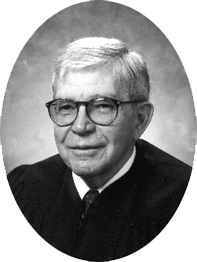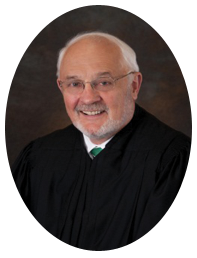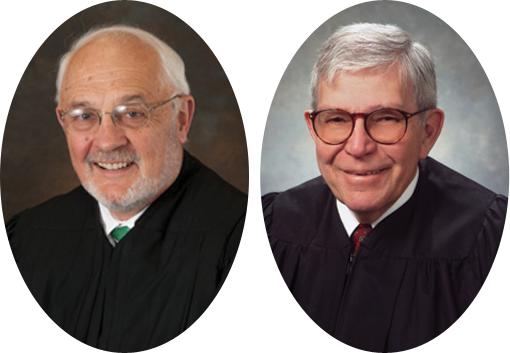18. Magistrate Judges of the District Court
Located: 1st floor, alcove outside Courtroom BExhibited: Photographs of past Magistrate Judges, District of New Hampshire
Magistrate judges are appointed by the district judges in each judicial district, with the assistance of a merit selection panel. They are authorized to preside over all phases of a civil case as long as the parties consent. They may also hear misdemeanor criminal cases. Magistrate judges may also handle various pretrial matters in cases assigned to a district judge, pursuant to the district judge’s delegation of such duties.
The magistrate judgeship system helps to alleviate the overburdened federal courts, which for years have seen substantial increases in their caseloads.

Magistrate Judges of the District Court
Magistrate judges are judicial officers of the United States District Courts whose positions are authorized by the Federal Magistrates Act of 1968. Unlike district judges, who are appointed by the President and confirmed by the United States Senate, magistrate judges are appointed to office by the district judges in each judicial district with the assistance of a merit selection panel. Full-time magistrate judges serve for a renewable eight-year term, while part-time magistrate judges serve for a renewable four-year term.
Magistrate judges replaced United States commissioners, whose duties were confined to certain procedural and administrative functions as well as trying petty offense cases. In contrast, magistrate judges may preside over all phases of a civil case (including trial) as long as the parties consent, as well as all misdemeanor criminal trials (although jurisdiction over certain types of misdemeanors requires the defendant to waive the right to a trial before a district judge). Additionally, in most judicial districts magistrate judges are authorized to hear and decide various pretrial matters in cases that are assigned to the district judges, such as discovery disputes, requests for search and arrest warrants, initial appearances and bail hearings in criminal cases. In short, the work of federal magistrate judges is essentially defined by the assignments they receive from the sitting district judges, who may delegate “such additional duties as are not inconsistent with the Constitution and laws of the United States.”
The creation of magistrate judgeships, and the breadth of their delegated authority, has helped to relieve an overburdened federal court system. District judges around the country have increasingly relied upon the assistance of magistrate judges, whose duties may vary considerably depending on each district court’s needs. The magistrate judge system is recognized as a valuable and flexible resource for meeting the challenges of growing caseloads.
The New Hampshire District Court is currently served by one full-time and one part-time magistrate judge. Photographs of past magistrate judges who served in this judicial district are displayed here. Photographs of all past New Hampshire District Court judges are displayed at both ends of the third floor hallway.
William H. Barry (1984 - 1995)

William H. Barry Jr. was born in Nashua, New Hampshire on February 3, 1920, and lived there his entire life.
He graduated from Nashua Senior High School in 1947 and recieved an AB in sociology from the College of the Holy Cross in Worcester, Mass., in 1956. He graduated from Suffolk Law School in 1961. He served in the army during the Korean conflict and was awarded the Purple Heart, the Korean Service Medal with two bronze stars and the United Nations Service Medal.
He was married to Nancy (Collins) Barry and together they had three children.
Barry practiced law in Nashua and became Clerk of the U.S. District Court in Concord in 1969, a job he held until 1984. He was appointed Magistrate Judge in 1984 and retired from the federal bench in 1995. Following his retirement, he practiced law with his son, William Barry III.
He was a lifelong Democrat and a delegate to the 1964 Democratic National Convention. He was the Democratic nominee for Congress in 1966. He enjoyed fishing, golfing, and camping.
James R. Muirhead (1995 - 2010)

Magistrate Judge Muirhead attended Cornell University, where he received a B.A. in 1963, and Cornell University Law School, where he received a LL.B. in 1966. He had twenty-nine years of trial experience in complex litigation prior to becoming a Magistrate Judge on September 1, 1995, including all types of commercial and business disputes, product liability, aviation accidents, negligence and various types of wrongful death cases. He represented plaintiffs and defendants. His practice in the commercial and business disputes area included the resolution of such disputes through alternative dispute procedures such as arbitration and mediation. His trial experience included in excess of one hundred jury trials.
He is a fellow of the International Society of Barristers and is a fellow of the American College of Trial Lawyers. He served as a Trustee of Franklin Pierce Law School, as president of the Board of New Hampshire Legal Assistance, as a member of the New Hampshire Bar Foundation, a member of the Board of Governors of the New Hampshire Bar Association for nine years, Chairman of the Continuing Legal Education Committee and as a member of several other Bar committees; and served on the New Hampshire Supreme Court's Task Force on the Courts from 1989 to 1990. He served as a director of the Greater Manchester Development Corporation and was Chairman of the Chamber of Commerce Task Force to study city government organization and operations.
He was appointed Magistrate Judge on September 1, 1995, reappointed September 1, 2003, and retired from full service on the federal bench in 2010.
Landya Boyer McCafferty (2010 - 2014)
Andrea K. Johnstone (2014 - present)

Magistrate Judges James Muirhead and William Barry



